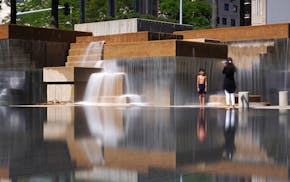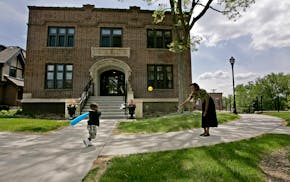My wife asked a question married men know too well, and dread: "Did you turn the air conditioning up?"
This is a point at which men may seize up, unaware of how best to proceed. This is dangerous territory. It's like negotiating with an alien species over radio waves, and they communicate by sensation, or light pulses. The possibility for error is high, and much rides on the outcome.
Complicating matters: What does it mean to turn the air conditioning up? Obviously, to increase the output of the air conditioner. But this is achieved by turning the air conditioning settings down. If the readout is set at 76, and you punch the buttons until it reads 74, you have turned it down, but this was achieved by turning the AC unit up.
When you turn the heat up, it gets warmer. But this is not heat.
Another problem: You did, indeed, turn it down, or up — and it's entirely possibly you turned it sideways, wouldn't surprise her — so now you're going to have to answer for it. Best to 'fess up right away: I did.
Some mad folly overtook me, and as I passed the control unit, I was seized with a schoolboy fascination with buttons and pressed them without heed. I was wrong. I admit it. I will never touch the controls again without permission, signed and notarized.
Men are from Mars, women from Venus — cute old cliche. But Venus is hotter than Mars, partly due to its proximity to the sun, partly due to its crushing atmosphere. Mars has barely any atmosphere at all, so sound travels poorly, which is why husbands on Mars don't hear what their spouses said under their breath on the other side of the planet.
Air conditioning is one of the boons of modern life, but it's also a drawback if it's cranked too high. My wife — and you may notice a theme here — recently took a flight with the thermostat so low that the passengers might have thought someone left a window open. Of course, the absence of flying debris in the cabin ruled that out, but it was ridiculously frigid.
She requested four airplane blankets, which provided all the smothering warmth of single-ply bathroom tissue. The whole plane looked like a troupe of Blue Man Group impersonators.
I find movie theaters to be too cold. There's probably a reason for it. If the patrons are too cold, they will buy boxes of Raisenettes, so the chewing will provide some warmth. In the old days before everyone had AC, movie theaters advertised in the summer about their arctic temps — people would walk in, wearing a suit and tie, drenched with sweat from the heat of July, and be encased in ice before the newsreel was over.
A recent trip to England showed a different approach to AC: They don't have it. The temps were hot for the sceptered isle, and if you asked anyone why they didn't go to the appliance store for a window unit, they looked at you as though you'd suggested buying a small fusion reactor to keep warm in winter. (My hosts were regarded as norm-breaking innovators because they had screens on the windows.)
Last year I stayed in a London hotel that had accumulated the heat of 250 summers. The windows only swung out an inch, due to some regulation passed in 1817, and you could boil tea with water straight from the tap.
The only relief was a fan that reminded me of childhood. It turned from side to side like someone watching a very slow tennis match. Great invention. The machine says: "I'm going to make it slightly cooler over here, where you are not, and then I'm going to get around to you, eventually, but then I'm going to make it cool over there, where you also are not."
It was good to get back to the States, where AC is a ubiquitous miracle. Thank you, Willis Haviland Carrier, the inventor of the thing that made desert cities possible and Midwest summers bearable.
By the way, Carrier was married three times. You wonder if the first one thought the house was too cold, the second thought it wasn't cold enough, and the third said: "Just right. You didn't fiddle with the controls, did you, Willis?"
"No, dear. I invented it and then left it alone."

Can a prison be beautiful? And should it?

These Minneapolis buildings resonate with baby boomers but baffle Gen Z

7 surprising gems to seek in Doors Open Minneapolis

Minneapolis' first maternity hospital in 1886 was a savior for unmarried mothers and unwanted babies


